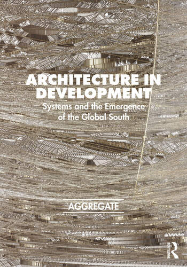Architecture in Development Systems and the Emergence of the Global South
Material type: TextLanguage: English Publication details: London : Routledge, c2022 Description: XIV, 434 p. : illISBN:
TextLanguage: English Publication details: London : Routledge, c2022 Description: XIV, 434 p. : illISBN: - 9781032045337
- 720.103 AGG
| Item type | Current library | Shelving location | Call number | Copy number | Status | Date due | Barcode |
|---|---|---|---|---|---|---|---|
 Reference Collection
Reference Collection
|
City Campus Library | City Campus | 720.103 AGG | 2022-23 | Available | 97881 |
summary :
This extensive text investigates how architects, planners, and other related experts responded to the contexts and discourses of “development” after World War II. Development theory did not manifest itself in tracts of economic and political theory alone. It manifested itself in every sphere of expression where economic predicaments might be seen to impinge on cultural factors. Architecture appears in development discourse as a terrain between culture and economics, in that practitioners took on the mantle of modernist expression while also acquiring government contracts and immersing themselves in bureaucratic processes. This book considers how, for a brief period, architects, planners, structural engineers, and various practitioners of the built environment employed themselves in designing all the intimate spheres of life, but from a consolidated space of expertise. Seen in these terms, development was, to cite Arturo Escobar, an immense design project itself, one that requires radical disassembly and rethinking beyond the umbrella terms of “global modernism” and “colonial modernities,” which risk erasing the sinews of conflict encountered in globalizing and modernizing architecture.
Encompassing countries as diverse as Israel, Ghana, Greece, Belgium, France, India, Mexico, the United States, Venezuela, the Philippines, South Korea, Sierra Leone, Singapore, Turkey, Cyprus, Iraq, Zambia, and Canada, the set of essays in this book cannot be considered exhaustive, nor a “field guide” in the traditional sense. Instead, it offers theoretical reflections “from the field,” based on extensive archival research. This book sets out to examine the arrays of power, resources, technologies, networking, and knowledge that cluster around the term "development," and the manner in which architects and planners negotiated these thickets in their multiple capacities—as knowledge experts, as technicians, as negotiators, and as occasional authorities on settlements, space, domesticity, education, health, and every other field where arguments for development were made.
